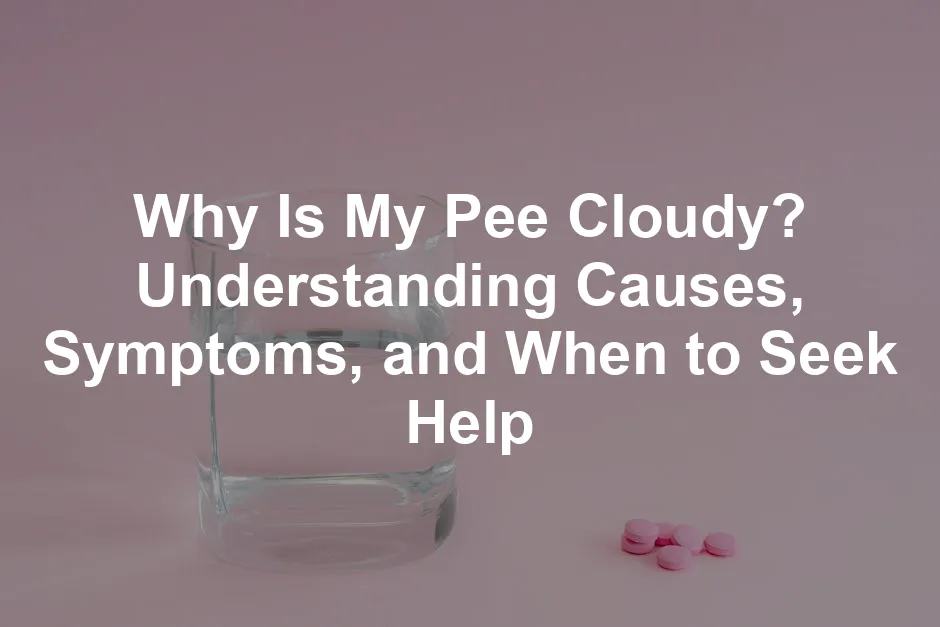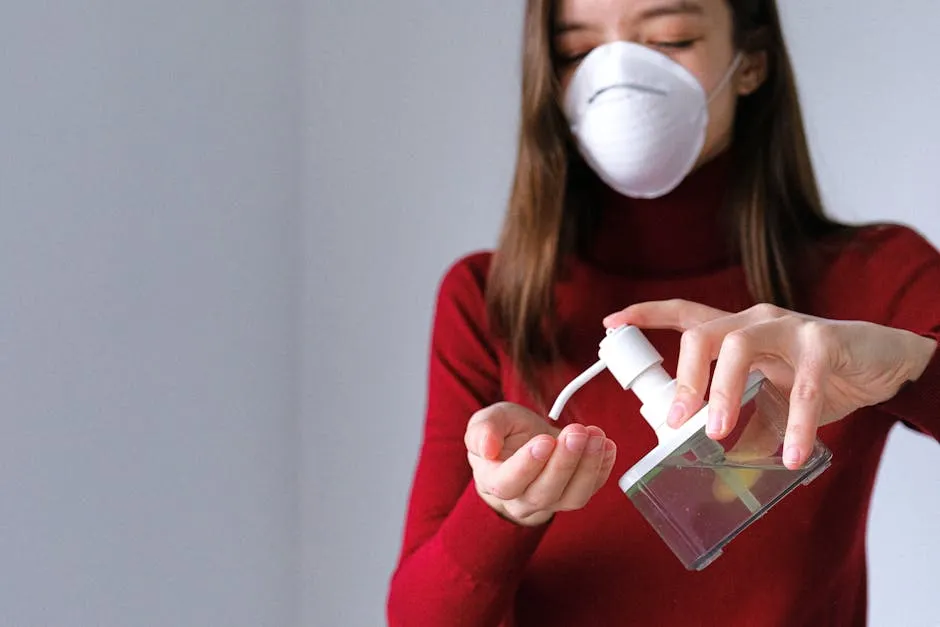
Why Is My Pee Cloudy? Understanding Causes, Symptoms, and When to Seek Help
Introduction
Cloudy urine can be a curious phenomenon that raises eyebrows and questions alike. One moment your pee is a perfectly clear, pale yellow, and the next, it resembles a murky puddle. But what does this change really mean for your health? While occasional cloudiness can be harmless and simply linked to dietary choices or dehydration, persistent cloudiness could indicate something more serious lurking behind the scenes. In this article, we’ll uncover the reasons behind cloudy urine, how it relates to your overall health, and when it’s time to consult a healthcare professional. So, grab a glass of water (stay hydrated!) and let’s unravel the mystery of cloudy pee together!
Cloudy urine occurs when your pee appears milky or hazy instead of the typical clear, light yellow color. It could be a harmless reaction to dietary changes or dehydration, but frequent episodes warrant a closer look. Common causes include high alkaline levels in urine, urinary tract infections (UTIs), kidney stones, diabetes, and even certain medications.
Dehydration is a leading cause, often resulting in concentrated, cloudy urine. Meanwhile, infections can introduce bacteria and white blood cells into the urine, creating an opaque appearance. Dietary influences, such as consuming high amounts of fruits and vegetables, can also alter urine clarity due to changes in pH levels.
If cloudy urine persists for more than a few days, or if it’s accompanied by other symptoms like pain, burning during urination, or changes in urine color, it’s crucial to seek medical attention.
In the following sections, we’ll break down the various causes of cloudy urine, discuss associated symptoms, explore treatment options, and provide guidance on when to consult a healthcare provider.

Staying hydrated is vital for your health! Consider using a Hydration Reminder Smart Bottle to keep track of your daily water intake. It’s like having a personal cheerleader reminding you to drink up!
Summary of Key Points
Cloudy urine occurs when your pee appears milky or hazy instead of the typical clear, light yellow color. It could be a harmless reaction to dietary changes or dehydration, but frequent episodes warrant a closer look. Common causes include high alkaline levels in urine, urinary tract infections (UTIs), kidney stones, diabetes, and even certain medications.
Dehydration is a leading cause, often resulting in concentrated, cloudy urine. Meanwhile, infections can introduce bacteria and white blood cells into the urine, creating an opaque appearance. Dietary influences, such as consuming high amounts of fruits and vegetables, can also alter urine clarity due to changes in pH levels.
If cloudy urine persists for more than a few days, or if it’s accompanied by other symptoms like pain, burning during urination, or changes in urine color, it’s crucial to seek medical attention.
In the following sections, we’ll break down the various causes of cloudy urine, discuss associated symptoms, explore treatment options, and provide guidance on when to consult a healthcare provider.
To ensure your urinary health, consider adding Urinary Health Supplements to your routine. They can help support your urinary tract and keep things flowing smoothly. After all, nobody likes a traffic jam in the bladder!

Understanding Cloudy Urine
What Is Cloudy Urine?
Cloudy urine is when your pee looks milky or hazy. This differs from normal urine, which should appear clear and light yellow, like a fine wine. Cloudy urine can signal various health concerns or even just a temporary issue. Typical urine color ranges from pale yellow to amber, depending on hydration levels. A sudden change in clarity often points to something brewing beneath the surface. So, if your pee resembles a frothy cappuccino instead of a refreshing lemonade, it’s time to pay attention.
Causes of Cloudy Urine
Dehydration
Dehydration can make your urine more concentrated, leading to cloudiness. When you don’t drink enough fluids, your kidneys retain water, causing urine to become darker and murky. Symptoms of dehydration include intense thirst, dry mouth, and minimal urination. To combat this, sip water like a fish gulps at a pond! Aim for at least eight glasses a day. And if you’re looking for a stylish way to keep your water handy, check out this Water Bottle with Time Marker!

Urinary Tract Infections (UTIs)
UTIs are a common reason for cloudy urine. They occur when bacteria invade the urinary system, igniting inflammation. Along with cloudy pee, look out for symptoms like a burning sensation while urinating and frequent urges to go. If left untreated, UTIs can escalate into serious complications. A swift trip to the doctor can get you back on track with antibiotics.
Kidney Stones
Kidney stones can also cause cloudy urine, as they lead to the presence of minerals and white blood cells. Symptoms include severe pain in your lower back or abdomen, nausea, and even blood in your urine. If you suspect kidney stones are the culprit, don’t hesitate to seek medical help. Increased fluid intake can sometimes help small stones pass. You might want to consider Kidney Stone Prevention Supplements as a proactive measure!
Dietary Factors
Your diet plays a significant role in urine clarity. Consuming high amounts of dairy, leafy greens, or foods rich in purines (like red meat and seafood) can affect urine pH, leading to cloudiness. If you notice a pattern, consider adjusting your meal plan. A balanced diet can help keep your urine as crystal clear as your intentions! For some delicious and healthy cooking inspiration, grab a Fruits and Vegetables Recipe Book.

Sexually Transmitted Infections (STIs)
STIs can lead to cloudy urine due to the presence of bacteria or discharge. Common culprits include chlamydia and gonorrhea. Symptoms may vary and often include unusual discharge, itching, or pain during urination. If you suspect an STI, testing is essential for treatment and peace of mind.
Diabetes
High blood sugar levels from diabetes can cause cloudiness in urine. The excess sugar spills into urine, creating an opaque appearance. Other symptoms of diabetes include excessive thirst, frequent urination, and fatigue. Keep an eye out for these signs and consult your healthcare provider if they arise.
Other Medical Conditions
Cloudy urine may also indicate various medical conditions, such as prostate issues, vaginitis, or chronic kidney disease. Each condition has its own set of symptoms, so it’s crucial to consult with a healthcare professional if you notice persistent changes in urine clarity.

Understanding the reasons behind cloudy urine is vital for maintaining your health. If you experience ongoing cloudiness or other concerning symptoms, don’t hesitate to reach out to a healthcare provider for guidance and support.
Care and Treatment for Cloudy Urine
Home Remedies and Prevention
Cloudy urine can be a nuisance, but worry not! There are simple home remedies and preventive measures to help keep your pee clear and bright.
Hydration
First and foremost, let’s talk about hydration. Water is your best friend! Staying hydrated is crucial for maintaining clear urine. Aim to drink at least eight glasses of water daily. When your body is well-hydrated, urine becomes diluted, reducing cloudiness. If you find yourself in hot weather or after a workout, crank up that water intake. Your kidneys will thank you! For those who love a little flavor in their water, consider a Water Infuser Pitcher to add some zest to your hydration routine!

Dietary Adjustments
Next up is your diet. Did you know that what you eat can influence your urine’s clarity? Foods high in alkaline, like fruits and vegetables, can change urine pH and contribute to cloudiness. While a healthy diet is essential, too much of these foods might not do your urine any favors. Consider balancing your meals with proteins and grains to maintain a healthy urine appearance. If you notice a pattern, take note! Adjusting your diet might just do the trick. To help you get started, a Cookbook for Healthy Meals could be your best friend!

Hygiene Practices
Lastly, let’s discuss hygiene practices. Proper hygiene can significantly reduce the risk of urinary tract infections (UTIs) and other infections that cause cloudy urine. Always wipe from front to back after using the restroom. This simple habit helps keep bacteria where they belong! Additionally, wearing breathable cotton underwear can help keep the genital area dry. If you’re sexually active, don’t forget to urinate after intercourse to flush out any bacteria that might have entered the urinary tract. You can find great options for Cotton Underwear for Women and Cotton Underwear for Men online!

When to Seek Medical Help
Sometimes, cloudy urine isn’t just an annoyance; it could be a sign that something more serious is brewing. Knowing when to seek medical help is essential for your health.
Persistent Symptoms
If your urine remains cloudy despite drinking plenty of water and making dietary adjustments, it’s time to consult a healthcare provider. Persistent cloudiness, especially when accompanied by other symptoms like pain, burning during urination, or a strong odor, warrants medical attention. These signs could indicate a urinary tract infection or other underlying conditions. Don’t ignore your body’s signals!
Diagnostic Tests
When you visit the doctor, they may order diagnostic tests to get to the bottom of your cloudy urine. A urinalysis is a common test that examines your urine’s appearance, concentration, and content. This test can help identify infections, kidney issues, or the presence of blood or crystals. Depending on the findings, your doctor might recommend further tests or treatments to address the root cause of the problem.

In summary, while cloudy urine can often be managed with home remedies and preventive measures, it’s essential to consult a healthcare professional if it persists or is accompanied by worrisome symptoms. Take charge of your health and stay informed!
Conclusion
In summary, cloudy urine can often stem from benign causes like dehydration or dietary choices. However, it’s essential to take persistent changes in urine clarity seriously. Your body communicates through its changes, so if your pee looks like a cloudy mystery for more than a few days, it’s time to tune in and listen.
If you experience additional symptoms—like pain, burning during urination, or even a sudden burst of color—don’t play the waiting game. Consulting a healthcare professional can lead you to the right answers and peace of mind.
Understanding potential causes, such as urinary tract infections, kidney stones, or diabetes, empowers you to take proactive steps toward your health. Staying hydrated and aware of your body can make a significant difference. And don’t forget to keep track of your hydration levels with a Digital Bathroom Scale to monitor your progress!

So, remember: while the occasional cloudy pee can be just a quirky health blip, persistent cloudiness may warrant more attention. Stay hydrated, eat a balanced diet, and don’t hesitate to seek help if needed. With these steps, you’ll navigate the waters of urinary health with confidence and clarity, leaving those cloudy concerns far behind.
FAQs
Is cloudy urine always a cause for concern?
Cloudy urine can be harmless. It often occurs from dehydration or dietary changes. However, if your pee remains cloudy for several days, it might signal underlying health issues, such as urinary tract infections (UTIs) or kidney stones. Persistent cloudiness deserves a chat with a healthcare professional. They can help decipher if there’s more than meets the eye.
Can diet alone cause cloudy urine?
Absolutely! Your diet plays a significant role in your urine’s appearance. Eating an abundance of fruits and vegetables can raise urine’s alkaline levels, leading to cloudiness. Dairy products and high-protein foods can also impact clarity. If you notice your urine getting murky after a meal, think about what’s on your plate!
What should I do if my urine is cloudy and smells bad?
If your cloudy urine comes with a strong, unpleasant odor, it’s time to reach out to a healthcare provider. This combination may indicate an infection or other medical issue that requires attention. Don’t ignore the signs—your body is trying to tell you something!
Can cloudy urine indicate pregnancy?
Pregnancy can lead to various changes in your body, including urine appearance. Hormonal fluctuations and increased fluid retention may cause cloudy urine. It’s essential to monitor other symptoms, like nausea or missed periods, and consult a healthcare provider for a comprehensive evaluation if you suspect pregnancy.
How can I prevent cloudy urine?
Prevention is key! Start by staying hydrated—drink plenty of water throughout the day. A balanced diet rich in whole foods can help maintain clear urine. Good hygiene practices, such as wiping front to back and urinating after sexual activity, also reduce the risk of infections that could cause cloudiness. Remember, a little attention goes a long way in keeping your pee clear!
Please let us know what you think about our content by leaving a comment down below!
Thank you for reading till here 🙂
Understanding the role of genetics in skin health can be beneficial. why do genetic factors influence wrinkle development and prevention
All images from Pexels




